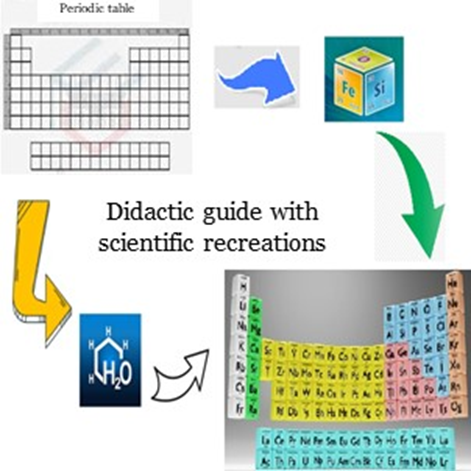Abstract
Didactic games for science teaching contribute to student learning and break with traditional teaching models. The objective of this study was to implement a didactic guide with scientific recreations to favor the learning of the periodic table in students with incomplete schooling in the 2022–2023 school year. For this purpose, an experimental, field and explanatory research was used. A population study was carried out with 60 students of the first year of high school of the “Velasco Ibarra” Fiscal Educational Unit. The main theoretical and empirical methods were used, as well as descriptive and inferential statistics for data processing, analysis and interpretation. A didactic guide with scientific recreations was elaborated to favor the learning of the periodic table in students with unfinished schooling, which was applied to the students of the “Velasco Ibarra” Fiscal Educational Unit, in the 2022–2023 school year. It was corroborated that the didactic guide with scientific recreations applied significantly improved the students’ learning of the periodic table.
References
Arce Urbina, M. E. The Value of Experimentation in the Teaching of Natural Sciences. The Science Workshop for Children at the Atlantic Campus of the University of Costa Rica: An Experience to Share. Education Journal. 2019, 26 (1), 147–154.
Barahona, A.; Constante, E. Methodological strategies in the Teaching-Learning Process of the subject of Chemistry, unit 2, in the International Baccalaureate Diploma Program, Eloy Alfaro Educational Unit, period 2018-2019. Degree thesis, Central University of Ecuador, 2019.
Barazarte, C.; Jerez, E. Application of the periodic bingo game as a strategy for the teaching-learning of the periodic table in the third year of high school. Degree thesis, University of the Andes, 2020.
Blandín, F.; Solórzano, R. Relevance of innovative strategies in the teaching-learning process of the chemical elements of the periodic table. Degree thesis, Central University of Venezuela, 2018.
Chiriboga, N. Management of digital strategies in the teaching-learning of the Periodic Table of Chemistry, First Year of General Unified High School, of the Municipal School “Juan Wisneth”, DM of Quito, 2021-2022. Degree thesis, Central University of Ecuador, 2022.
Cuichán, S. Didactic strategies for the significant learning of block number 2 of chemistry in first year students of unified general high school of the Colegio Fisco Misional “San Jerónimo” of Píntag in the school year 2013-2014. Degree thesis, Central University of Ecuador, 2018.
Franco-Mariscal, A. J.; Oliva-Martínez, J. M.; Bernal-Márquez, S. A literature review on the role of educational games in the study of the chemical elements.: Part I: Games for knowledge of the Periodic Table. Educ. Quím. 2012, 23 (3), 338–345.
Galagovsky, R. Teaching Chemistry vs. Learning Chemistry. An equation that is not balanced. Living Chemistry. 2007, 6 (Sup), 1–13.
García Posso, B. E.; Posso García, L. M. Didactic situations in the teaching of chemical bonding. Educere. 2017, 21 (70), 581–592.
Ministry of Education. General Regulations to the Organic Law of Intercultural Education of Ecuador; Ministry of Education, 2015.
Ministry of Education. Education for Youth and Adults; Ministry of Education, 2019.
Mondeja, D.; Zumalacárregui, B.; Martín, M.; Ferrer, C. Didactic games: useful in higher education? University Pedagogy. 2001, 6 (3), 65–76.
Orlik, Y. Chemistry: active teaching and learning methods; Editorial Iberoamérica, 2002.
Pérez, R. A different way of teaching inorganic chemistry. Cuban J. Chem. 2018, 27 (2), 197–203.
Rannikmiae, M.; Tildsepp, A.; Sushko, A. Elements of didactic games in chemistry classes; Chemistry and School, 1982.
Rengifo Ávila, G. K.; Espinoza Freire, E. E. Study on problems in Ecuadorian education and educational policies, 1990-2018. Metropolitan J Appl Sci. 2019, 2 (3), 175–182.
Rodríguez Lorbada, G. Adult learning theories to design effectively. Guillermo Rodríguez Lorbada, 2017. https://lorbada.com/blog/2017/04/22/teorias-de-aprendizaje-para-adultos-para-disenar-con-eficacia (accessed 2022-02-16).
Sanmartí, N. Writing to learn science. Aula de Innovación Educativa. 2008, 175, 29–32.
Torres, C. M. The game: an important strategy. Educere. 2002, 6 (19), 289–296.
Tang, K.-S.; Rappa, N. A. The role of metalanguage in an explicit literacy instruction on scientific explanation. Int. J. Sci. Math. Educ. 2001, 19 (7), 1311–1331. https://doi.org/10.1007/s10763-020-10121-6
Valdés, G. Application of augmented reality for the elaboration of chemistry experiments as a support tool in the teaching of their reactions; University of Cundinamarca, 2019.
Yager, R. E. The constructivist learning model: Towards real reform in science education. The Science Teacher. 1991, 58 (6), 52–57.

This work is licensed under a Creative Commons Attribution 4.0 International License.
Copyright (c) 2023 Eclética Química





